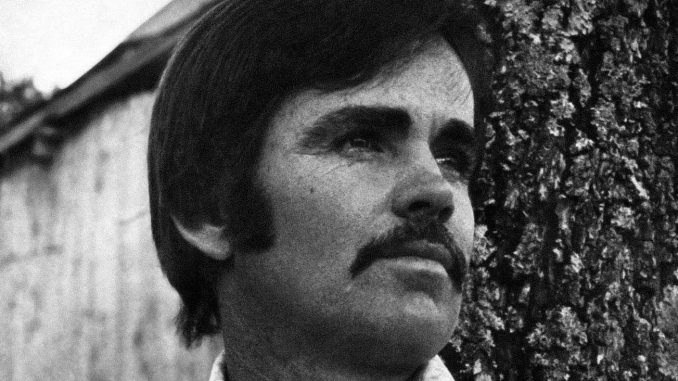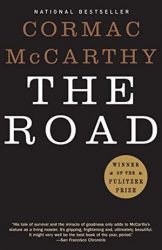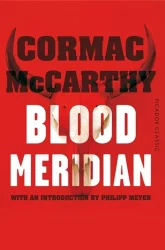
John William DeForest coined the term “the great American novel” in an 1868 essay. He defined it as “the picture of the ordinary emotions and manners of American existence.” He felt that Uncle Tom’s Cabin’, which we’ve covered here, was the closest approach to fulfilling that brief at the time.
In a 2009 piece on the Literary Hub website about the Great American Novel David Vann was quoted on Cormac McCarthy’s ‘Blood Meridian’: “A great American novel can only be anti-American, and ‘Blood Meridian’ focuses on our greatest shames, in this case our genocides and our desire for war, contemplating in its final chapters the slaughter of the buffalo; also the slaughter of innocence in the form of a dancing bear, and the slaughter of any would-be penitents, including the kid. The last look west has to see nowhere else to go”.
His other contenders for “Great American Novels” are The Border Trilogy which includes ‘All the Pretty Horses’ (1992), ‘The Crossing’ (1994), and ‘Cities of the Plain’ (1998). These coming-of-age novels detail the adventures of two young cowboys, John Grady Cole, and Billy Parham, who are featured individually in the first two books with their stories overlapping in the last.
 McCarthy died on June 13th, 2023. He came late to recognition of his writing, with his books often drifting out of print not long after they were published. The publication of All the Pretty Horses’ was the turning point and his work started to gather praise. In 2007 his post-apocalyptic novel ’The Road’ won the Pulitzer Prize for fiction.
McCarthy died on June 13th, 2023. He came late to recognition of his writing, with his books often drifting out of print not long after they were published. The publication of All the Pretty Horses’ was the turning point and his work started to gather praise. In 2007 his post-apocalyptic novel ’The Road’ won the Pulitzer Prize for fiction.
For me ‘The Road’ is the best of his work. Having read the Border Trilogy and ‘Blood Meridian’ in the past and found them hard going, I tried ‘The Road’ recently. Depicting a journey through America following an unspecified cataclysm has wiped out industrial civilization and most life, maybe it appealed to the Science Fiction fan in me. It was as unremittingly bleak as his other books, but it just felt more appropriate here rather than in the Western-themed Border Trilogy or ‘Blood Meridian’. I’m not alone in finding his work a struggle. On Goodreads ‘The Road’ veers from 1-star to 5-star reviews from readers with little middle ground. The New York Times accused him of “writing sentences that sometimes veered close to nonsense”. So did some of the criticism of his work. James Wood, writing in The New Yorker called McCarthy a “colossally gifted writer” and “one of the great hams of American prose, who delights in producing a histrionic rhetoric that brilliantly ventriloquizes the King James Bible, Shakespearean and Jacobean tragedy, Melville, Conrad, and Faulkner.” The San Francisco Chronicle said of his writing style: “Depending on the book – and  even passages within certain books – McCarthy’s writing can be characterized as minimalistic, meandering, esoteric, humorous, terrifying, pretentious, sentimental or folksy.” The “nonsense” claim seems to hinge around his extremely long sentences with little punctuation, which is certainly one of the things that makes it a hard read for me.
even passages within certain books – McCarthy’s writing can be characterized as minimalistic, meandering, esoteric, humorous, terrifying, pretentious, sentimental or folksy.” The “nonsense” claim seems to hinge around his extremely long sentences with little punctuation, which is certainly one of the things that makes it a hard read for me.
What this complex writing style did produce was good material for screenwriters, who could sum up the lengthy expositions in a few frames of film. The Coen Brothers adaptation of ‘No Country for Old Men’ won the best picture Oscar as well as 3 more Academy Awards and many more accolades. The 2009 adaptation of ‘The Road’ was described as “haunting, harrowing, powerful”, but earlier films of his work met with generally critical responses.
His linear writing style with little punctuation, and a uniquely personal style, along with the often-graphic violence seems to make the case for Cormac McCarthy’s version of the great American novel one that valued artifice and literary pretension above accessibility. There is little likelihood of reaching agreement on what is THE great American novel. With so many contenders depending on your reading preferences, from Gatsby and Lolita to John Dos Passos and Junot Díaz, the one thing they do tend to have in common is an antihero, perhaps we are getting somewhere with a definition, in which case Cormac McCarthy’s work is worth due consideration. I just wish I liked it a bit more.
One of Nick Cave and Warren Ellis’ evocative pieces form the score of ‘The Road’.



I tried reading All The Pretty Horses some years ago and frankly found it too difficult to get into. But by the time of No Country For Old Men he’d simplified his style to the point where the story took prominence and what a great story it is. In my view, his next and final novel, The Road is one of the handful of great books written in the 21st Century. McCarthy’s dim view of human nature is as prominent as ever but in this case softened by the love of father and son, and the end offers at least a flicker of hope amid the darkness. If you haven’t read either or both of NCFOM or The Road I can’t recommend them highly enough. He will be missed – a giant of US Literature.